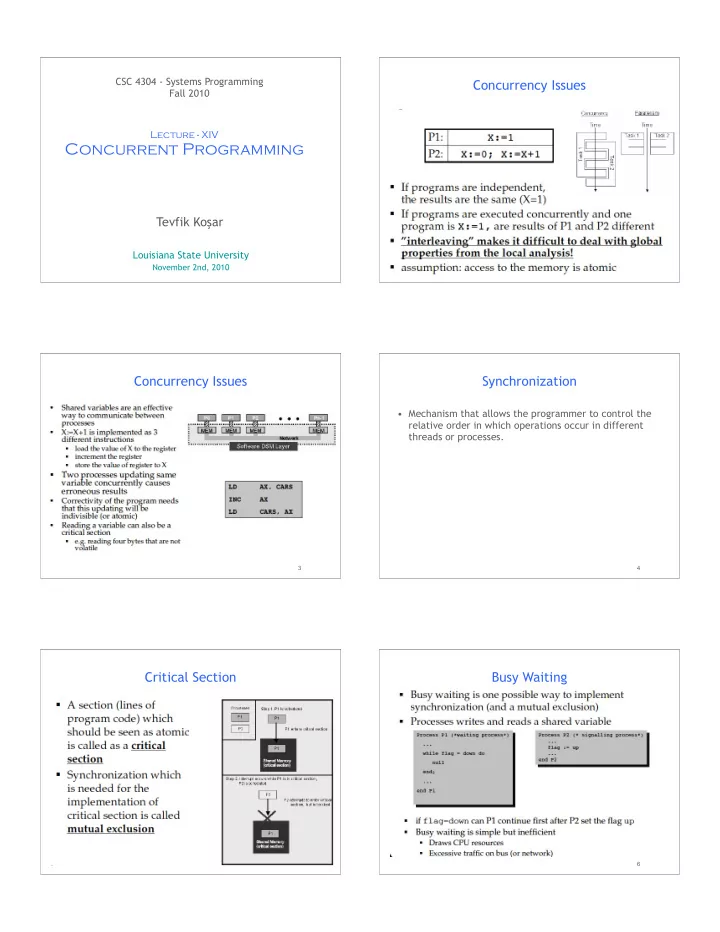

CSC 4304 - Systems Programming Concurrency Issues Fall 2010 Lecture - XIV Concurrent Programming Tevfik Ko � ar Louisiana State University November 2nd, 2010 1 2 Concurrency Issues Synchronization • Mechanism that allows the programmer to control the relative order in which operations occur in different threads or processes. 3 4 Critical Section Busy Waiting 5 6
Suspend and Resume Mutual Exclusion 7 8 Mutual Exclusion: Problem 1 Mutual Exclusion: Problem 2 9 10 Mutual Exclusion: Problem 2 Mutual Exclusion: Problem 3 11 12
Mutual Exclusion: Problem 3 Mutual Exclusion: Solution 13 14 POSIX Threads: MUTEX MUTEX Example #include <pthread.h> ... int pthread_mutex_init(pthread_mutex_t *mutex, const pthread_mutexattr_t pthread_mutex_t my_mutex; // should be of global scope ... *mutexattr); int main() int pthread_mutex_lock(pthread_mutex_t *mutex); { � int tmp; int pthread_mutex_unlock(pthread_mutex_t *mutex); � ... int pthread_mutex_destroy(pthread_mutex_t *mutex); � // initialize the mutex � tmp = pthread_mutex_init( &my_mutex, NULL ); � ... • a new data type named pthread_mutex_t is designated for � // create threads � ... mutexes � pthread_mutex_lock( &my_mutex ); � do_something_private(); • a mutex is like a key (to access the code section) that is � pthread_mutex_unlock( &my_mutex ); � ... handed to only one thread at a time � return 0; • the attribute of a mutex can be controlled by using the } pthread_mutex_init() function Whenever a thread reaches the lock/unlock block, it first determines if the • the lock/unlock functions work in tandem mutex is locked. If so, it waits until it is unlocked. Otherwise, it takes the mutex, locks the succeeding code, then frees the mutex and unlocks the code when it's done. 15 16 Semaphores Semaphores • Semaphore S – integer variable • Two standard operations modify wait() and signal() Int sum = 0; – Originally called P() and V() – wait (S) { Thread 2: Thread 1: while S <= 0 int t; int t; ; // no-op wait(sem); S--; wait(sem) } sum = sum + x; sum = sum + y; t = sum; t = sum; – signal (S) { S++; … …. } signal(sem); signal(sem); • Less complicated • Can only be accessed via two indivisible (atomic) operations Use of semaphores for thread synchronization! 17 18
POSIX: Semaphores POSIX: Semaphores (cont.) • semaphore control: • creating a semaphore: int sem_post(sem_t *sem); int sem_init(sem_t *sem, int pshared, unsigned int value); initializes a semaphore object pointed to by sem int sem_wait(sem_t *sem); pshared is a sharing option; a value of 0 means the sem_post atomically increases the value of a semaphore by semaphore is local to the calling process 1, i.e., when 2 threads call sem_post simultaneously, the gives an initial value value to the semaphore semaphore's value will also be increased by 2 (there are 2 atoms calling) • terminating a semaphore: sem_wait atomically decreases the value of a semaphore by 1; but always waits until the semaphore has a non-zero int sem_destroy(sem_t *sem); frees the resources allocated to the semaphore sem value first usually called after pthread_join() an error will occur if a semaphore is destroyed for which a thread is waiting 19 20 Semaphore: Example Semaphore: Example (cont.) #include <pthread.h> void *thread_function( void *arg ) #include <semaphore.h> { ... � sem_wait( &semaphore ); void *thread_function( void *arg ); � perform_task_when_sem_open(); ... � ... sem_t semaphore; // also a global variable just like mutexes � pthread_exit( NULL ); ... } int main() { � int tmp; � ... � // initialize the semaphore � tmp = sem_init( &semaphore, 0, 0 ); � ... � // create threads � pthread_create( &thread[i], NULL, thread_function, NULL ); � ... � while ( still_has_something_to_do() ) � { � � sem_post( &semaphore ); � � ... � } � ... � pthread_join( thread[i], NULL ); � sem_destroy( &semaphore ); � return 0; } � 21 22 Deadlock Dining Philosophers Problem • Five philosophers spend their time eating and thinking. • They are sitting in front of a round table with spaghetti served. •There are five plates at the table and five chopsticks set between the plates. • Eating the spaghetti requires the use of two chopsticks which the philosophers pick up one at a time. •Philosophers do not talk to each other. •Semaphore chopstick [5] initialized to 1 23 24
Dining-Philosophers Problem (Cont.) To Prevent Deadlock • The structure of Philosopher i : • Ensures mutual exclusion, but does not prevent deadlock Do { wait ( chopstick[i] ); //lock • Allow philosopher to pick up her chopsticks only if both wait ( chopStick[ (i + 1) % 5] ); //lock chopsticks are available (i.e. in critical section) • Use an asymmetric solution: an odd philosopher picks // eat up first her left chopstick and then her right chopstick; signal ( chopstick[i] ); //unlock and vice versa signal (chopstick[ (i + 1) % 5] ); //unlock // think } while (true) ; 25 26 Acknowledgments • Advanced Programming in the Unix Environment by R. Stevens • The C Programming Language by B. Kernighan and D. Ritchie • Understanding Unix/Linux Programming by B. Molay • Lecture notes from B. Molay (Harvard), T . Kuo (UT- Austin), G. Pierre (Vrije), M. Matthews (SC), B. Knicki (WPI), M. Shacklette (UChicago), J.Kim (KAIST), J. Schaumann (SIT), E. Cuansing (Purdue), and J. Vuori (JYU). 27
Recommend
More recommend